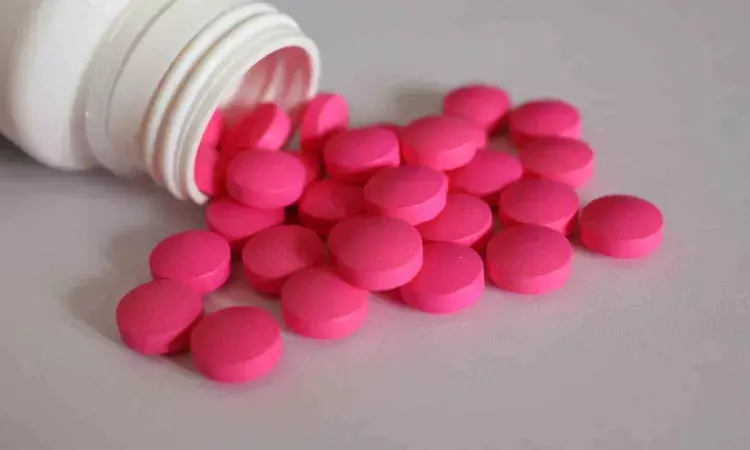- Home
- Medical news & Guidelines
- Anesthesiology
- Cardiology and CTVS
- Critical Care
- Dentistry
- Dermatology
- Diabetes and Endocrinology
- ENT
- Gastroenterology
- Medicine
- Nephrology
- Neurology
- Obstretics-Gynaecology
- Oncology
- Ophthalmology
- Orthopaedics
- Pediatrics-Neonatology
- Psychiatry
- Pulmonology
- Radiology
- Surgery
- Urology
- Laboratory Medicine
- Diet
- Nursing
- Paramedical
- Physiotherapy
- Health news
- Fact Check
- Bone Health Fact Check
- Brain Health Fact Check
- Cancer Related Fact Check
- Child Care Fact Check
- Dental and oral health fact check
- Diabetes and metabolic health fact check
- Diet and Nutrition Fact Check
- Eye and ENT Care Fact Check
- Fitness fact check
- Gut health fact check
- Heart health fact check
- Kidney health fact check
- Medical education fact check
- Men's health fact check
- Respiratory fact check
- Skin and hair care fact check
- Vaccine and Immunization fact check
- Women's health fact check
- AYUSH
- State News
- Andaman and Nicobar Islands
- Andhra Pradesh
- Arunachal Pradesh
- Assam
- Bihar
- Chandigarh
- Chattisgarh
- Dadra and Nagar Haveli
- Daman and Diu
- Delhi
- Goa
- Gujarat
- Haryana
- Himachal Pradesh
- Jammu & Kashmir
- Jharkhand
- Karnataka
- Kerala
- Ladakh
- Lakshadweep
- Madhya Pradesh
- Maharashtra
- Manipur
- Meghalaya
- Mizoram
- Nagaland
- Odisha
- Puducherry
- Punjab
- Rajasthan
- Sikkim
- Tamil Nadu
- Telangana
- Tripura
- Uttar Pradesh
- Uttrakhand
- West Bengal
- Medical Education
- Industry
Neurotrophin peptidomimetic drugs offer promise for treating neurodegenerative disorders, finds researchers

Neurotrophin peptidomimetic drugs offer promise for treating neurodegenerative disorders, finds researchers
New Delhi: Peptidomimetic drugs - or synthetic molecules that mimic the structure of natural proteins can be repurposed to provide an effective therapeutic strategy to treat neurodegenerative diseases (NDs) by promoting neuronal growth and survival.
Neurodegenerative diseases (NDs) have been a major global health challenge. While neurotrophins, proteins crucial for neuronal survival and function, have shown promise as potential treatments, their instability and rapid degradation have hindered their therapeutic application.
Neurotrophin peptidomimetics are developed to target specific biological functions and can be valuable tools in drug discovery, especially when natural peptides have limitations like poor oral bioavailability or susceptibility to degradation.
One of the significant advantages of peptidomimetics is their improved stability and bioavailability compared to endogenous neurotrophins. This means they can be delivered more effectively to the brain and maintain their therapeutic activity for a longer duration. Additionally, peptidomimetics can be designed to be more specific to their target receptors, reducing the risk of side effects.
A team of scientists at the Indian Association for the Cultivation of Science (IASST), an autonomous institute of the Department of Science and Technology (DST), has been exploring peptidomimetics, synthetic compounds designed to mimic neurotrophins, as a potential solution to these limitations.
Led by Prof. Ashis K. Mukherjee, the IASST researchers have conducted extensive studies on neurotrophin peptidomimetics. Their research, published in the Journal Drug Discovery Today focused on understanding the signaling pathways involved in neuronal growth and survival, the potential pharmacological targets of peptidomimetics, and their therapeutic applications for NDs.
The researchers have highlighted the potential of peptidomimetics to treat NDs by promoting neuronal growth and survival. They have also explored the possibility of repurposing existing peptidomimetic drugs for other diseases, such as cancer, and the potential for developing new drug prototypes based on neurotrophins mimetics.
"As research progresses, the hope is that peptidomimetics could become a key therapeutic strategy, offering new hope for managing and treating neurodegenerative disorders for future generations," Ministry of Science & Technology stated in a release
Ruchika Sharma joined Medical Dialogue as an Correspondent for the Business Section in 2019. She covers all the updates in the Pharmaceutical field, Policy, Insurance, Business Healthcare, Medical News, Health News, Pharma News, Healthcare and Investment. She has completed her B.Com from Delhi University and then pursued postgraduation in M.Com. She can be contacted at editorial@medicaldialogues.in Contact no. 011-43720751
Dr Kamal Kant Kohli-MBBS, DTCD- a chest specialist with more than 30 years of practice and a flair for writing clinical articles, Dr Kamal Kant Kohli joined Medical Dialogues as a Chief Editor of Medical News. Besides writing articles, as an editor, he proofreads and verifies all the medical content published on Medical Dialogues including those coming from journals, studies,medical conferences,guidelines etc. Email: drkohli@medicaldialogues.in. Contact no. 011-43720751


